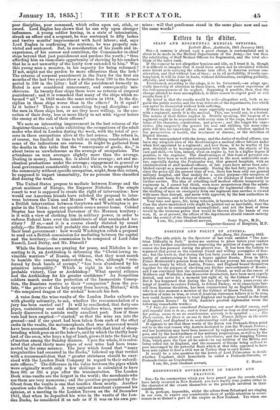POSITION AND POLICY OF AUSTRIA.
Ark-Bury, 9th January 1855. Sin—The able article in the Spectator of last week entitled "rhe Aus- trian Difficulty in Italy" makes me anxious to place before your readers one or two further considerations respecting the position of Austria, and the course she has pursued during the present war. It has been the fashion to represent that power as the constant friend and willing accomplice of Rus- sia; but the truthis, that during the last forty years she has lost no oppor- tunity of endeavouring to form a league against Russia. Even in 1815, Prince Metternich's pension from the Czar did not prevent his entering into the secret treaty by which Austria, France, and England bound themselves together for the purpose of checking any further encroachments of Russia and I am convinced that the restoration of Poland, as well as the rescue of Moldavia and Wallachia from Muscovite domination, have been most eagerly desired, and never for a moment lost sight of, by the Cabinet of Vienna. But it has happened that during the last five-and- wenty years every at- tempt of Austria to restore Poland to defend Turkey, or to emancipate her- self from Russian thraldom, has been counteracted by an English Minister, who is at this moment a member of the Cabinet of Queen Victoria. If this assertion of mine be true, or even if Austrian statesmen believe it to be true, how could Austria venture to trust England and to place herself in the front rank against Russia ? In 1818, Austria's greatest diplomatist wrote the following remarkable words- " I have for years considered Palmerston our tnost decided enemy, and still consider him to be eo ; and to trust England as long as that man guides her policy, seems to me an anachronism scarcely to be equalled The Porte resists, but there is no one to back her. France follows in the wake of England, and England is in understanding with Bussia." It appears to me that these words of the Baron von Prokesch-Osten point
out to us the real reason why Austria hesitated to join the Western Powers ; and her hesitation may have been increased by supposed revolutionary dan- gers, and by the backwardness of her military preparations, as well as by the correspondence about the sick man's inheritance, and the bungling Vienna Note, which gave the Czar all he asked—to say nothing of the Militia not being called out in England, and the massacre of Sinope being suffered to pass unavenged by the powerful fleets which at that time appeared to have been sent rather to feed a civil war in Turkey than to curb Russia. It would be a nice question for the lovers of Lord Palmerston to decide whether Urquhart shall henceforth be called a Prokesch-Ostenite, or Prokesch-Osten an Urquhartite.
I am, Sir, your obedient servant, F. Manx.






























 Previous page
Previous page